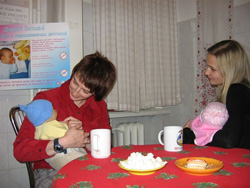You are here » Home » Telling Our Story
Success Story
Maternity hospital improves treatment for HIV-positive mothers
Tearing Down Barriers for HIV Mothers

| |
Photo: JSI/Alexander Golubov
|
|
Mothers discuss baby care in Symferopol.
“The trainers and various workers in the HIV/AIDS field .... changed Maternity Hospital Number Two medical staff’s attitudes to HIV-positive women,” said Dr. Illya Glazkov, the hospital’s chief physician. In coordination with the President’s Emergency Plan for AIDS Relief, USAID sponsored training in HIV/AIDS for hospital staff.
|
Two new mothers sit together, chatting at Maternity Hospital Number Two, in Symferopol, Crimea. An observer would never notice the difference between them, but one of them is HIV positive. “I don’t feel any different from the other women here,” said Natalia G. “I eat together with the other women and we talk about how we will care for our babies. My relatives can also come here any time and spend as much time as they want.”
Thanks to USAID, Natalia does not experience the stigma and discrimination that often comes with HIV. She is just a happy mother with a healthy daughter. But had she delivered her daughter a year ago, things may have been quite different.
When USAID-sponsored experts arrived at Maternity Hospital Number Two, where all HIV-positive women from Crimea deliver, they found that HIV women were often treated differently. The hospital had isolated HIV-positive women in basement delivery and operation rooms and isolated postpartum rooms, where guests were not allowed. In addition, infants born to HIV-positive women, who should not breastfeed, were separated from their mothers and fed clumsily by poorly trained staff. The most visible manifestation of the stigma was a thick, brick wall constructed specifically to separate HIV-positive women from everyone else.
In less than a year, USAID’s project helped establish HIV prevention and treatment services and improve care for HIV-positive expecting and new mothers. The project held trainings on preventing mother-to-child transmission and organized workshops with health care providers that had experience working with HIV-positive populations. HIV-positive women also learned about special delivery methods, C-sections, treatments, optimum support and counseling in the postpartum period, family-oriented support, and referral mechanisms in case of emergencies.
Today, HIV-positive women deliver in comfortable, private delivery rooms at the maternity hospital and relatives are encouraged to visit and help feed the babies. This support is particularly helpful because all HIV-positive women deliver their babies by Caesarean section to reduce the risk of HIV transmission to newborns. And last but not least, that solid brick wall separating HIV-positive women from the rest of the hospital has come down.
Print-friendly version of this page (405kb - PDF)
Click here for high-res photo
Back to Top ^ | 

